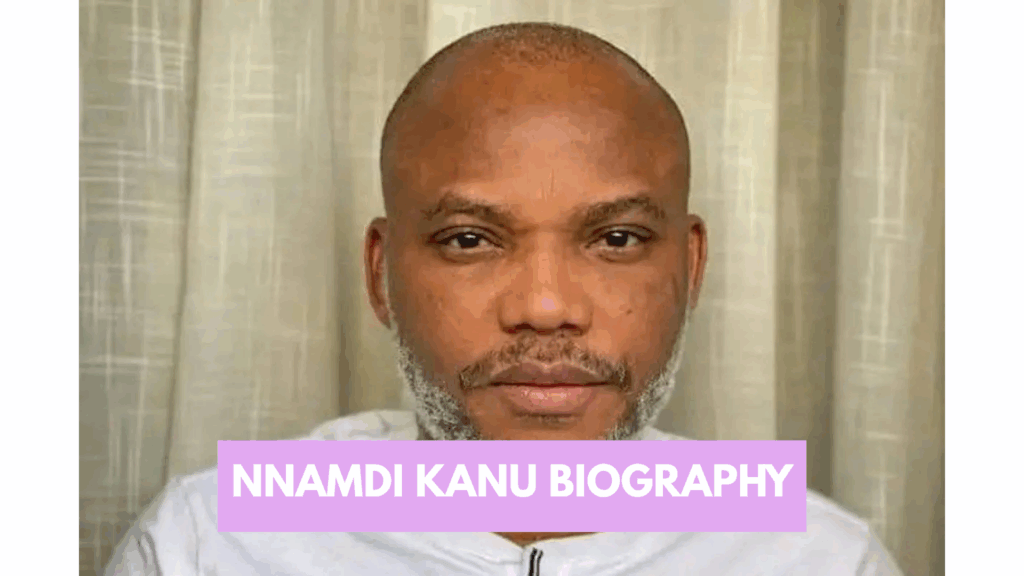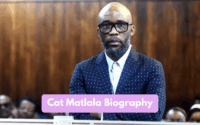Nnamdi Kanu Biography: Wife, Children, News, Arrest, State of Origin

Nnamdi Okwu Kanu is one of the most polarizing and closely watched political figures in modern Nigerian history. As the founder and public face of the Indigenous People of Biafra (IPOB) and the director of Radio Biafra, Kanu has become synonymous with the renewed push for Biafran self-determination in southeastern Nigeria.
His life story mixes grassroots activism, diasporic lobbying, courtroom drama, and sharp debate about nationalism, human rights, and state security. Some view him as a freedom fighter; others call him a separatist whose tactics threaten stability. This biography traces his early life, activism, legal battles, and present status.
Early life and education
Nnamdi Nwannekaenyi Kenny Okwu Kanu was born on 25 September 1967 in Isiama Afara Ukwu, Umuahia, in what is today Abia State, Nigeria — a birthdate and place often referenced because they fall in the immediate aftermath of the 1967 declaration of the short-lived Republic of Biafra. He attended local primary school and then Government College Umuahia for secondary education. Kanu later moved to the United Kingdom, where he pursued higher studies and became involved with diasporic Nigerian networks. Sources vary on the precise details and institutions of his university studies, but multiple records indicate he studied political/economic subjects while in the UK.
How he became an activist: Radio Biafra and IPOB
Kanu first rose to public attention through Radio Biafra, an address-and-broadcast platform established to articulate grievances and calls for a revived Biafran state. He used the station to argue for self-determination for the Igbo people of southeastern Nigeria and to challenge the federal government’s handling of regional grievances. In 2012–2014 he formalized his political project by founding the Indigenous People of Biafra (IPOB), an organization advocating for the restoration of an independent Biafra. His style combined media outreach, diasporic lobbying, and direct appeals to international audiences.
Arrests, bail, disappearance and re-arrest
Kanu’s activism repeatedly brought him into conflict with Nigerian authorities. He was first arrested by Nigeria’s Department of State Services in October 2015 on charges including treasonable felony, detained for over a year, and then released on bail in April 2017. In 2017 he disappeared while on bail and subsequently resurfaced overseas. In 2021 he was detained in Kenya and controversially transferred to Nigeria — a rendition that generated international questions about process and legality. His detention and the legal process that followed were marked by repeated court appearances, requests for bail, and judicial delays.
Trial, charges and the state’s stance
Nnamdi Kanu has faced multiple serious charges from the Nigerian state, including counts related to terrorism and treasonable offenses. Nigerian authorities have argued that IPOB, and a splinter armed group sometimes associated with the movement, posed security threats in the southeast. Kanu’s trials have been highly visible, with changes of judges, procedural challenges, and spirited courtroom exchanges. International human rights groups and diasporic supporters have argued that many of the actions against him amount to political persecution; the government has countered that the law must address any calls for violence or the forced displacement of citizens.
Recent developments and sentence (novel updates)
In a significant development in late 2025, a Nigerian court convicted and sentenced Nnamdi Kanu on terrorism-related charges, handing down a life sentence. The ruling was widely reported and has intensified debates and protests in parts of Nigeria. This conviction represents a major turning point in Kanu’s long-running legal saga and will almost certainly shape IPOB’s future trajectory and the broader politics of southeastern Nigeria. (News sources: The Guardian — coverage of the conviction; Reuters — trial background and prosecution history.)
Political beliefs, rhetoric and religious identity
Kanu’s political program centers on the restoration of Biafra and an assertion of Igbo self-determination, frequently framed around historical grievances dating back to the 1967–1970 civil war. He has combined ethno-political appeals with religious language; notably, Kanu has publicly asserted a connection with Judaism and has sometimes worn religious symbols during court appearances and public rallies. These stylistic and symbolic elements have made him a unique and sometimes hard-to-categorize political actor.
International lobbying and diaspora networks
A notable feature of Kanu’s strategy has been engagement with the diaspora. IPOB’s international outreach included radio broadcasts, social media campaigns, and lobbying in Western capitals. Documents filed to U.S. authorities in prior years show that Kanu and associated figures worked to attract international attention, including hiring lobbyists and reaching out to sympathetic organizations and politicians abroad. Diaspora activism has been central to sustaining IPOB’s visibility even when domestic organizing was constrained by security operations.
Support, criticism and local impact
IPOB enjoys strong support among many in the Igbo heartland who feel marginalized by national politics — especially younger activists and communities that point to economic neglect and perceived political exclusion. Critics — both inside and outside Nigeria — have accused the movement of encouraging civil disobedience, and security agencies have linked some violent incidents in the southeast to breakaway armed cells. The real impact on ordinary people has been mixed: for some the movement rekindles hope for self-rule; for others the consequences of clashes with security forces and enforced shutdowns have been painful.
Legacy and the road ahead
Kanu’s influence will be judged in multiple ways: whether IPOB survives his absence or sentence as an organized movement; whether legal or political negotiations emerge to address longstanding grievances; and how Nigerian institutions and international partners respond to protests and security concerns. His case highlights unresolved issues in Nigerian federalism, transitional justice, and the right of communities to seek redress without recourse to violence. The conviction and sentence handed down in 2025 raise urgent questions about reconciliation, due process, and political solutions to deep-rooted regional issues.
Frequently Asked Questions (FAQs)
When and where was Nnamdi Kanu born?
He was born on 25 September 1967 in Isiama Afara Ukwu (Umuahia), Abia State, Nigeria.
What is IPOB?
IPOB is the Indigenous People of Biafra, a movement founded by Nnamdi Kanu in the early 2010s advocating for the secession or self-determination of Biafra in southeastern Nigeria.
Why was Kanu arrested?
Nigerian authorities have charged him with offenses including treasonable felony and terrorism, citing public speeches and alleged links to violent incidents; supporters say the prosecution is politically motivated. His legal saga includes arrests in 2015 and a re-arrest/extradition in 2021.
What was the outcome of his trial?
In late 2025, a Nigerian court convicted Kanu on terrorism-related charges and sentenced him to life imprisonment, a ruling that drew protests and renewed debate.
Is IPOB a violent organization?
IPOB’s official line has emphasized non-violent self-determination, but Nigerian authorities have pointed to violent enforcement by splinter groups (like the Eastern Security Network) and used that to justify security operations. The reality on the ground is complex and contested.
Conclusion
Nnamdi Kanu’s life and activism encapsulate many of Nigeria’s unresolved tensions: historical trauma from the Biafra war, questions of minority marginalization, and the limits of political dissent in a diverse federation. Whether seen as a hero, a provocateur, or a criminal, his trajectory — from Radio Biafra broadcasts to international lobbying to high-profile trials — has reshaped political discourse in southeastern Nigeria and beyond. The 2025 conviction marks a dramatic chapter, but the underlying grievances and debates that propelled Kanu into the public eye remain. Any long-term solution will require careful, inclusive political engagement that addresses both security concerns and the region’s economic and political aspirations.


